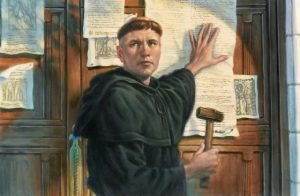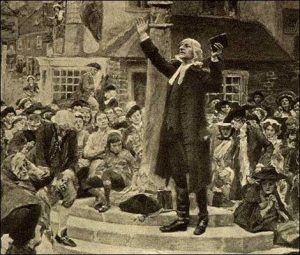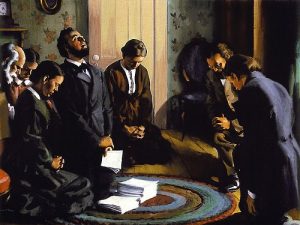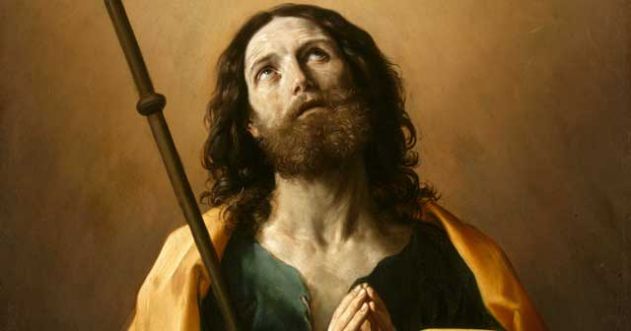Lesson for September 27-October 3, 2014
Last quarter we explored the teachings of Jesus, equipping ourselves with the gospel truth. One might wonder why we follow this expansive amount of crucial knowledge with a look at the rather small book of James. With only one book written by James in the New Testament, we tend to overlook this powerful apostle, forgetting that he was the brother of Jesus and thereby familiar with His life from childhood on.
Martin Luther, after being challenged in a debate in 1519 with the Roman Catholic scholar Johann Eck, tended to shy away from the book of James, which was used by Eck to support his stand on justification by works. A more prayerful study of James, however, will lead to an appreciation of James’ understanding of the relationship between faith and works.
One can decipher James’ sometimes puzzling comments about faith and works, when we remember that he isn’t telling us how to become a Christian, but how to live like one. As a matter of fact, this letter from James can be seen as a practical manual on how to live the Christian life. There are many words of wisdom in these short five chapters, worth framing in our memory.
Some of the topics we’ll find in James are:
- how to handle doubt and temptation
- what attitude we should have toward the rich and the poor
- the importance of watching our language
- how to pray effectively
Key Text: ” ‘You are My friends if you do whatever I command you’ ” John 15:14 NKJV
This is a statement from Jesus Himself, but reflects the theme for much of James’ counsel. James is concerned that we be “doers of the word, and not hearers only” (James 1:22).
Sunday: James, the Brother of Jesus
James’ simple identification of himself in his epistle, “James, a bondservant of God and of the Lord Jesus Christ”, leads us to believe that he must have been well known in the church. There are three other James, two of them disciples, mentioned in the New Testament, but only the one thought to be Jesus’ brother seems to fit this qualification of being well known.
There was:
- the disciple James, John’s brother, called one of the Sons of Thunder–“James the son of Zebedee and John the brother of James, to whom He gave the name Boanerges, that is, ‘Sons of Thunder’;” Mark 3:17 NKJV
- another disciple James–“Andrew, Philip, Bartholomew, Matthew, Thomas, James the son of Alphaeus, Thaddaeus, Simon the Cananite;” Mark 3:18 NKJV
- the father of a disciple–“Judas the son of James, and Judas Iscariot who also became a traitor.” Luke 6:16 NKJV
And finally, the Gospel of Mark mentions James, one of Jesus’ brothers, who has traditionally been thought to have written the epistle of James. ” ‘Is this not the carpenter, the Son of Mary, and brother of James, Joses [Joseph], Judas, and Simon? And are not His sisters here with us?’…” Mark 6:3 NKJV
There has been recent conjecture about whether these were true brothers, or even half-brothers of Jesus. But traditionally it has been thought that Joseph was a widower when he married Mary. Therefore these were referring to Joseph’s older children from his previous marriage. Some have even argued that these may have been cousins or had some other family connection. But the word “brother” in the original language, specifies “brother”, not “cousin”, and most translations render it this way. [The book “The Desire of Ages” also confirms this view, calling them brothers.]
James is also thought to be the eldest of the brothers, since his name was mentioned first in the list, in keeping with Jewish custom. Another reason he is thought to be a half-brother is due to the fact that Jesus entrusted the care of His mother to John, His beloved disciple, while He was on the cross (John 19:26, 27).
The following two passages confirm that Jesus’ family of half-brothers and sisters, including James, were not supportive of His ministry before His crucifixion and resurrection:
“But when His own people heard about this, they went out to lay hold of Him, for they said, ‘He is out of His mind.’ “ Mark 3:21 NKJV
“Now the Jews’ Feast of Tabernacles was at hand. His brothers therefore said to Him, ‘Depart from here and go into Judea, that Your disciples also may see the works that You are doing. For no one does anything in secret while he himself seeks to be known openly. If You do these things, show Yourself to the world.‘ For even His brothers did not believe Him.” John 7:2-5 NKJV
This almost sounds like the blasphemous taunting of the religious leaders and those who scorned Him on the cross saying, “Let Him now come down from the cross, and we will believe Him.”
Discussion Questions: What led His brothers to urge Him to present Himself publicly at the Feast of Tabernacles?
Why did Jesus’ brothers have such a hard time understanding His mission as Messiah? Did they even believe Him to be the Messiah?
How could knowing Jesus from His childhood and youth have influenced James’ later outlook on Christianity?
Monday: James, the Believer
Despite James and his brothers being such harsh critics of Jesus during His ministry, something must have happened along the way. Two passages indicate that James had a change of heart, which later propelled him into being an influential leader in the early church.
“and that He was seen by Cephas [Peter], then by the twelve. After that He was seen by over five hundred brethren at once, of whom the greater part remain to the present, but some have fallen asleep. After that He was seen by James, then by all the apostles.” I Corinthians 15:5-7 NKJV
One might gather from this passage that Jesus made a special appearance to James, as he was mentioned separately. And then he and his brothers were later included with those who met at Pentecost.
“These all continued with one accord in prayer and supplication, with the women and Mary the mother of Jesus, and with His brothers.” Acts 1:14 NKJV
Perhaps that special visit from Jesus after the resurrection led to James being with the group that met and prayed together at Pentecost. In any event, he was obviously included with those who received the special outpouring of the Spirit at that time. Later he’s mentioned several times in the book of Acts and even becomes the moderator for the Jerusalem Council in Acts 15.
Evidence that James, the brother of Jesus, is the one indicated in these texts and that he was a pillar of the faith seems to be confirmed in Galatians, where Paul tells us:
“Then after three years I went up to Jerusalem to see Peter, and remained with him fifteen days. But I saw none of the other apostles except James, the Lord’s brother.” Galatians 1:18, 19 NKJV
“and when James, Cephas [Peter], and John, who seemed to be pillars, perceived the grace that had been given to me, they gave me and Barnabas the right hand of fellowship, that we should go to the Gentiles and they to the circumcised.” Galatians 2:9 NKJV
Discussion Questions: Why was humility necessary for James to become the spiritual giant that he was to the church, and why would it be especially difficult for him, as opposed to others?
Why are family members sometimes our harshest critics or our greatest supporters?
Tuesday: James and the Gospel
With legalistic-sounding statements like:
- “be ye doers of the word, and not hearers only” (James 1:22),
- “for whosoever shall keep the whole law, and yet offend in one point, he is guilty of all” (James 2:10),
- “Resist the devil, and he will flee from you”, and
- “to him that knoweth to do good, and doeth it not, to him it is sin” (James 4:17)…
 …we may understand a bit why Martin Luther and other Protestants, who had just discovered the true meaning of salvation by faith alone, were shy about studying James’ epistle.
…we may understand a bit why Martin Luther and other Protestants, who had just discovered the true meaning of salvation by faith alone, were shy about studying James’ epistle.
But a deeper study reveals that James did understand how faith fit into the picture of salvation. For someone who has already received Christ into his life, James’ counsel proves very beneficial in maintaining that close walk of faith that we so desire after our baptism.
 Later in the Protestant movement, during the time called the Great Awakening in the 1700s, Jonathan Edwards, George Whitefield, and the Wesley brothers established a greater emphasis on the role of holy living as part of the gospel.
Later in the Protestant movement, during the time called the Great Awakening in the 1700s, Jonathan Edwards, George Whitefield, and the Wesley brothers established a greater emphasis on the role of holy living as part of the gospel.
 But it wasn’t until the Advent Awakening in the 1800s, when the Seventh-day Adventist Church was founded, that these two messages of faith AND works were combined, which has led to the witness of a people who “keep the commandments of God, AND the faith of Jesus” (Revelation 14:12).
But it wasn’t until the Advent Awakening in the 1800s, when the Seventh-day Adventist Church was founded, that these two messages of faith AND works were combined, which has led to the witness of a people who “keep the commandments of God, AND the faith of Jesus” (Revelation 14:12).
Here are some other verses in James that help us see that James did not discount the value of having faith and a spiritual connection with God:
- “Knowing this, that the trying of your faith worketh patience.” James 1:3
- “If any of you lack wisdom, let him ask of God…” James 1:5
- “But the wisdom that is from above is first pure, then peaceable, gentle, and easy to be entreated, full of mercy…” James 3:17
- “Draw nigh to God, and he will draw nigh to you…” James 4:8
- “Confess your faults one to another, and pray one for another, that ye may be healed…” James 5:16
James, in true simplicity and love, shows us that true faith will be shown in the life and character of the believer. Any controversy about faith and works could be quickly shut down with a deep, prayerful study of this epistle of James.
Discussion Questions: Why is it important to align our faith with our actions?
Read James 1:27 (“Pure religion and undefiled before God…To visit the fatherless and widows…”). Is this text to be understood literally, or can we use it as a principle in how to express our faith with our actions? How do we apply this verse in today’s world? How are our motives addressed here (see last part of the verse–“and to keep oneself unspotted from the world”)?
Wednesday: To the Twelve Tribes Scattered Abroad
James addresses his epistle to “the twelve tribes which are scattered abroad.” Who are these twelve tribes and why are they scattered? Peter’s first epistle likewise writes to “the pilgrims of the Dispersion” NKJV
The Dispersion mentioned in Jesus’ time meant Jews who had been scattered and were living outside Israel. John 7:35 says, “Then the Jews said among themselves, ‘Where does He intend to go that we shall not find Him? Does He intend to go to the Dispersion among the Greeks and teach the Greeks?’ ” NKJV
Were James and Peter both addressing their letters only to Jews then? Or is this a new Dispersion that included Gentiles? James hinted at such a phenomenon in a prophecy delivered by Amos. James quotes it in Acts 15:16, 17.
” ‘ After this I will return and will rebuild the tabernacle of David, which has fallen down; I will rebuild its ruins, And I will set it up; So that the rest of mankind may seek the Lord, Even all the Gentiles who are called by My name, Says the Lord who does all these things.’ “ NKJV
God has always used scattering or dispersions for a divine purpose. Even though it has occurred under less than favorable circumstances, God uses this method to spread the gospel. Whether it was a result of war and pillage (as with the Babylonian and other conquests) or the result of persecution of Jewish Christians shortly after the resurrection (especially after the stoning of Stephen).
This is why Peter was not hesitant to call Christians “a chosen generation, a royal priesthood, a holy nation, His own special people” (I Peter 2:9). They were the “new Twelve Tribes”!
Discussion Questions: Why is it significant that the Seventh-day Adventist church is a world-wide church with a presence in over 200 nations? (As a matter of fact, only 7% of its members are in the United States, making it most likely the most worldwide Protestant church denomination.) What factors have made this happen and why do we need to continue our focus on mission fields, far and near?
Even though there are vast differences in cultures and ethnicity, what unites Seventh-day Adventists and makes us distinct from other church denominations?
Thursday: James and Jesus
As an older half-brother, James had the special opportunity of observing Jesus when He was a child, a youth, and then as an adult. Although he probably didn’t have the same intimacy that Jesus’ close disciples enjoyed by living with Him and journeying with Him during His three years of ministry, he seems to be very familiar with His teachings and character.
These passages show the similarity between the Jesus and His brother James:
- James 1:22 “But be doers of the word, and not hearers only, deceiving yourselves.” NKJV
- Matthew 7:24-27 ” ‘Therefore whoever hears these sayings of Mine, and does them, I will liken him to a wise man who built his house on the rock…’ ” NKJV
- James 3:12 “Can a fig tree, my brethren, bear olives, or a grapevine bear figs? This no spring yields both salt water and fresh.” NKJV
- Matthew 7:16 ” ‘You will know them by their fruits. Do men gather grapes from thornbushes or figs from thistles?’ “ NKJV
- James 4:12 “There is one Lawgiver, who is able to save and to destroy. Who are you to judge another?” NKJV
- Matthew 7:1 ” ‘Judge not, that you be not judged.” NKJV
We can see from these examples that James had a personal knowledge and acquaintance with Jesus’ teachings. Faith dominates his writing, showing that James was not content with a weak, vacillating, fruitless kind of faith. And he recognized that a vital relationship with Jesus was crucial in maintaining that kind of faith.
Discussion Questions: Why does James call himself a “bondservant” of Jesus, rather than His brother? What does this show about his character?
Look for and discuss the themes of humility and true wisdom in the following passages: James 1:9-11, 21; 3:13-18; 4:6-10.
Summary
“Written just over a decade after Christ’s resurrection [some time between A.D. 44 and 49], the book of James provides us with the earliest glimpse into the early Christian church. Additionally, James, the brother of Jesus, provides an excellent example of moving from unbelief to faith. James became a well-respected leader in the early Christian church, and through this letter he provides insights into how faith and actions work together and explains why that is important.” ~The Teachers Comments, Sabbath School Quarterly, p. 12
Challenge
Using two verses, James 1:5, 6 (“If any of you lack wisdom…”) and Philippians 4:13 (“I can do all things through Christ…”), make a list of your beliefs and values and another list of your roles and activities in life. With prayerful thought, consider ways to balance your lists, aligning your faith with your actions. Are you really living out your faith, or just going through the motions?
Next week: The Perfecting of Our Faith
To read the Sabbath School lesson, or to see more resources, go to www.ssnet.org








